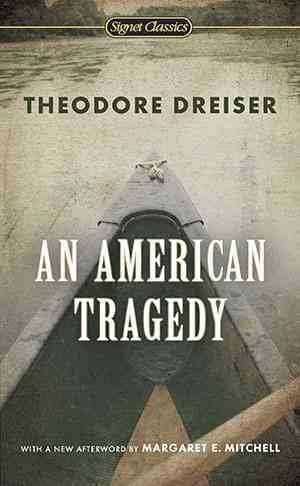 Staff Review by Chris Saliba
Staff Review by Chris SalibaIn this dark portrait of American society and its values, Theodore Dreiser shows how putting the pursuit of money and status on a pedestal as the ultimate goal of a people leads inevitably to its moral collapse. An American Tragedy raises endless questions about the pernicious effects of a society based on money, greed, social climbing and envy.
Theodore Dreiser’s 1925 novel, the grandiloquently titled An American Tragedy, was a huge success in its day. It further made its cultural mark when it was filmed by George Stevens in 1951 as A Place in the Sun, starring Montgomery Clift and Elizabeth Taylor. It’s worth noting that Clift does a superb job portraying the handsome and morally weak Clyde Griffiths (renamed George Eastman for the film).
It’s intriguing that An American Tragedy was such a smash with the American public. The novel is a long, merciless 900 page critique of American capitalism and its aspirational, or rather covetous, consumer culture. Dreiser’s tome is almost the antidote to Ayn Rand’s somewhat agonised defence of capitalism, Atlas Shrugged (1957).
Dreiser based his story on a 1906 real life murder case which had obsessed him for years. Chester Gillette was convicted of killing his 20-year-old girlfriend Grace Brown, who was pregnant at the time. Gillette was executed in the electric chair in 1908. For years Dreiser collected clippings on the case before working the story into his magnum opus.
The genius of An American Tragedy is that Dreiser takes the tawdry basic details of the 1906 murder case and fleshes them out into a fully realised novel. The curtains on the public spectacle of a murder case are drawn back to show in exhaustive detail the social, psychological and economic conditions that prompted a morally weak Clyde Griffiths into murdering his girlfriend Roberta Arlen. American success, a quality to be deeply envied, is epitomised in the character of Sondra Finchley. She is pretty, rich and without a care. She belongs to a world of endless parties, shopping and pleasure seeking. When Clyde starts getting drawn into her circle (he works for his successful uncle, a shirt collar manufacturer, which allows him entre into this social milieu), he tries to hide his poor background and vague social status. When he gets the working class Roberta Arlen pregnant, he has already started running with this new rich crowd. Roberta puts pressure on him to marry her and take responsibility. Thus the weak minded Clyde must make the decision: commit to Roberta, step down on the class ladder and remain in a poorly paid job. Or he could pursue his relationship with Sondra and consolidate his aspirations for a life of wealth, ease and luxury. But what to do with Roberta, threatening to go public with everything? A recent murder case in the newspapers provides a gruesome answer. After much agonising, the cowardly Clyde plots to go through with drowning Roberta, but things don’t turn out as planned.
The most compelling aspect of Dreiser’s An American Tragedy is the persuasive way he takes the reader right through Clyde Griffith’s short, failed life. From a poor family of Christian preachers, to a naïve participant in the American economy working as a bellhop, to aspiring social climber, to his slow motion decline and fall. Dreiser worked as a journalist, and his penchant for extraordinary detail permeates the text. Every single tremor and movement in Clyde’s thinking and psyche is described convincingly. Indeed, it’s very easy to walk in Clyde’s shoes. This uncanny realism gives the impression that Clyde is part self-portrait of the author. The scenes of 1920s American life, the popular pursuits and public places, are also drawn very well. You feel like you’ve stepped back in time to experience the luxuriant American hotel lobbies and cars.
This may sound like a far-fetched claim, but in many ways An American Tragedy reminded me of Dostoyevsky’s Crime and Punishment and Shakespeare’s Hamlet. Of course Dreiser cannot match Dostoyevsky’s wit and relentless inventiveness, his nimble prose and idiosyncratic characters, but the psychology of a moral weakling trying to hide a crime but subconsciously knowing that he cannot erase his guilt approaches Dostoyevsky’s brilliance. Clyde Griffiths also has echoes of Hamlet, in his indecisiveness and inability to set a moral compass. We read 900 pages of him floundering about American society’s different classes, unable to decide on what he really values, and what decisions he should take to set a future course. Clyde Griffiths doesn’t have any of Hamlet’s intelligence or philosophical insights, but he suffers the same inertia. American society offers many temptations, but Clyde struggles to discover their true value.
An American Tragedy is a gloomy, critical and pessimistic novel, yet strangely enough it makes for compelling reading. Dreiser ensures his story moves at a cracking pace, even if it is at times freighted down with a lot of detail. For the most he part refrains from openly moralising, but the cumulative effect is one of evoking endless questions about the pernicious effects of a society based on money, greed, social climbing and a deep seated envy. Clyde Griffiths is morally weak and vacillating, yet we also feel sympathy for him. He’s trying to get ahead in an aggressively commercial society that looks down on those without money and position as losers deserving of contempt. Dreiser doesn’t suggest we show sympathy for Clyde, but he does insist on understanding. Clyde Griffiths is weak and possibly a murderer, but the reader also feels sure that if he had received the right guidance at the right time, he would have turned out a fairly decent fellow.
An American Tragedy is a huge and absorbing work, one that is at times quite demanding. I felt shaken to my core after having read it, but also hugely rewarded.
An American Tragedy, by Theodore Dreiser. Published by Signet Classics. ISBN: 9780451531551 RRP: $14.95
No comments:
Post a Comment